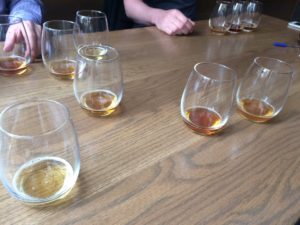 This past weekend I served as the Head Judge for the Northern Lands Festival beer competition. For those who don’t know Northern Lands, it is a premiere beverage and food event profiled, exclusively, Canadian wine, craft beer and craft spirits along with some of Edmonton’s best restaurants. The second iteration of the event runs May 2 – 6. While wine is the major component of the event, the beer section is growing.
This past weekend I served as the Head Judge for the Northern Lands Festival beer competition. For those who don’t know Northern Lands, it is a premiere beverage and food event profiled, exclusively, Canadian wine, craft beer and craft spirits along with some of Edmonton’s best restaurants. The second iteration of the event runs May 2 – 6. While wine is the major component of the event, the beer section is growing.
The beer competition wasn’t huge (not all of the beer exhibitors elected to enter the competition), but there is no question it offered some of the best craft beer in western Canada, going by the quality of the entries we tried.
Judging was performed by myself, Owen Kirkaldy (one of Canada’s only Master-ranked BJCP judges) and Kurt Stenberg, a long-time National-ranked BJCP judge. (For the record, I also am National-ranked). We evaluated some excellent beer and at times the decisions were quite tough.
Quickly, here were the big winners of the event, and then I want to go on to discuss lessons taken from the competition. Beer were entered according to BJCP style and then we collapsed to make larger flights for judging.
Category 1: Lagers and Light Ales
Winner: Alley Kat Scona Gold Kolsch
Runner-Up: Yellowhead Premium Lager
Category 2: Strong Beer, Sour and Specialty
Winner: Brewsters Blue Monk Barley Wine
Runner-Up: Wildrose Cowbell Kettle Sour
Category 3: Pale, Amber and Dark Beer
Winner: Alley Kat Full Moon Pale Ale
Runner-Up: Alley Kat Amber
Category 4: IPAs
Winner: Bench Creek White Raven IPA
Runner-Up: Bench Creek Apex Predator Double IPA
Best of Show: Alley Kat Scona Gold Kolsch
Informally I can say that best of show came down to a VERY tight decision between Scona Gold and White Raven. Bench Creek also finished third in IPA (with their Red Rye IPA), so clearly they are onto something.
I think I speak for all three of us that we were mildly surprised at the final results. We all admit to not having recognized many of the beer we selected as winning – including Full Moon, a beer we all have been drinking on a semi-regular to regular basis for years.
That is the first take-away for me coming out of the competition. It is a reminder that blind tasting matters. You think you know a beer, but when forced to sample it without knowing who made it, you come at it from a different direction. Blind tasting strips away preconceived notions and forces you to meet the beer on its merit alone. I also think that with beer with which we are more familiar, maybe we stop drinking it so consciously. Take Full Moon for example. I know its flavour profile very well. But it may be that familiarity that leads me to be less mindful when I drink it. I take a sip and go “aahh, that’s a nice Full Moon”, and then take the rest for granted. I don’t appreciate it any less, but I think about it less. Evaluating it blind requires me to put my judge hat back on and REALLY consider the flavour profile.
The second take-away is that I think sometimes we all get distracted by the new and exciting. A new brewery comes out we haven’t tried yet. Or someone brings out an envelope pushing seasonal that everyone is talking about. There is nothing wrong with reaching for the new. But it is good to remember once in a while that there is lots of really well-made beer out there. Just because it lacks some of the current buzz doesn’t mean it stops being a really good beer. The list of winners suggests that it is a good idea to go back to those mainstays once in a while. It may surprise you at just how much you enjoy them.
The Northern Lands competition isn’t the largest around – open only to breweries who are participating in the festival – so it is fair to say this is not indicative of all beer out there right now. Totally true. But you can’t win if you don’t enter. Like any competition, all the judges can do is rate the beer before them and pick a winner. We can’t say “well that beer that didn’t enter is better”, in part because, you know, when tasted blind side-by-side it may very well turn out that it isn’t.
That is why blind tasting matters.



April 24, 2017 at 10:21 AM
A lot of what I learned this weekend was more confirming what I already knew about the breweries that won. I knew that Alley Kat made great beer, and that I loved Bench Creek IPAs, but it is instructive to know that I like these beers on their own merits, and not because of my personal relationships with people in the beer scene.
April 25, 2017 at 9:41 AM
Are blind tastings not the norm at industry events like this? I assumed that blind tastings were the norm for judging, not just in the BJCP world.
Great article, congratulations to the winners!
April 26, 2017 at 9:09 AM
They are, but often I am tasting either home brew or beers with which I am less familiar, rather than an old favorite. It is a kind of forced mindfulness, where you can’t ignore or discount the qualities of a beer about which you might have a preconceived notion. I think there is a temptation with some of the established breweries to think, “Oh, that’s ‘Just’ [Alley Kat] [Wild Rose] [Brewsters] [Dare I Say Big Rock]”
April 25, 2017 at 9:56 AM
I’m not clear about the Full Moon you refer to in the article. Is this an Alberta product? Thanks
April 26, 2017 at 8:52 AM
Full Moon Pale Ale is a longstanding favorite Edmonton beer, made by Alley Kat, Edmonton’s oldest craft brewery. If you are a longtime beer nerd in Edmonton, you have consumed plenty of Full Moon over the years.
April 26, 2017 at 1:24 AM
Yes, bigsky, the Full Moon as well as the Amber & the Scona Gold Kolsch are Alberta (Edmonton in particular) products. Full Moon being a personal favourite of mine – a fine locally brewed Pale Ale.
April 26, 2017 at 6:39 PM
Huh. I wouldn’t give much respect to any competition that’s NOT blind and, like another commenter, am surprised to hear there are some that aren’t.
April 27, 2017 at 2:21 PM
I don’t think the takeaway from this article is that some competitions are not blind tasted. I have never been involved in a competition that was not. The point of this article is that as experienced judges who have consumed the entered beer for over a decade, we were surprised by the outcome. You often don’t think about mainstay beers that have been on the market forever. The temptation is to consider those “Beginner Beer” or “Gateway Beer” and disregard it in favor of newer things. I think the message is that you ignore old favorites at your peril.